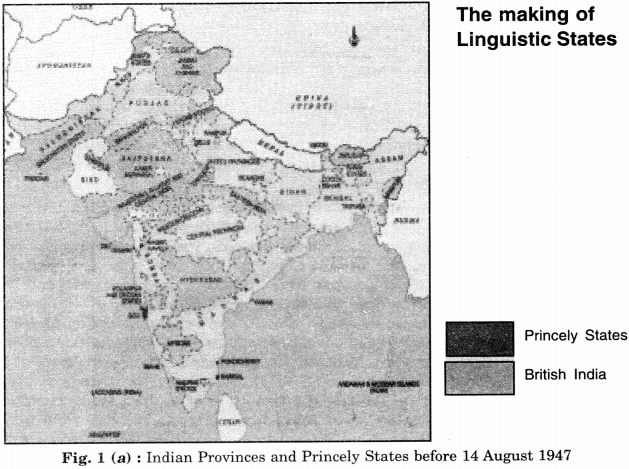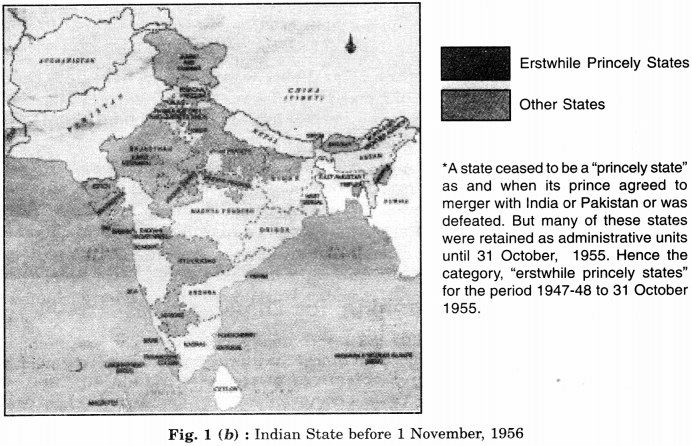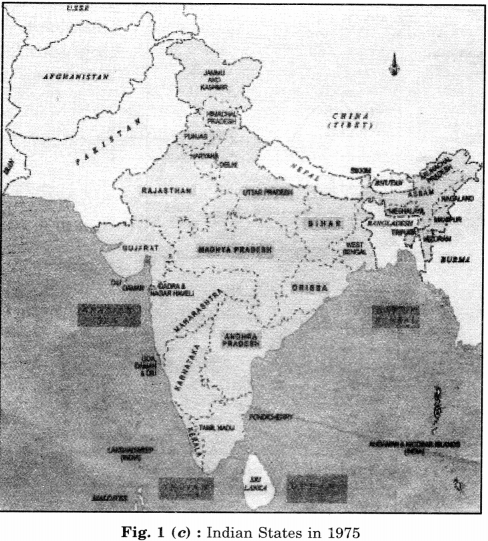India After Independence Class 8 Questions and Answers History Chapter 12
History Class 8 Chapter 12 NCERT Textbook Questions and Answers
Question 1.
You are witness to an argument between an adivasi and a person who is opposed to the reservation of seats and jobs. What might be the arguments you heard each of them put forward? Act out the conversation.
Answer:
Hints :
Adivasi — “We are also Indians, we have full right in all types of jobs”
Person — “No, you are of lower caste”. “You do not have the right to rule over us.
Adivasi — Why? “Has God given you more powers”
Person — ‘Yes ! We are of high castes.”
Adivasi — ‘You have the same blood as we have.”
Person — “Yes ! I oppose the reservation of seats given to you all.” Adivasi — “We will fight for our rights.”
Question 2.
Name three problems that the newly independent nation of India faced.
Answer:
The problems of 8 million refugees, the problem of the princely states and the problems of unity and development were faced by the newly independent nation of India.
Question 3.
What was the role of the Planning Commission?
Answer:
The Planning Commission helped design and execute suitable policies for economic development.
Question 4.
Fill in the blanks :
1. Subjects that were placed on the Union list were ………………., ………………… and ……………. .
2. Subjects on the concurrent list were …………. and …………..
3. Economic planning by which both the state and the private sector played a role in development was called a ……………. model.
4. The death of …………….. sparked off such violent protests that the government was forced to give in to the demand for the linguistic state of Andhra.
Answer:
1. Taxes, defence, foreign affairs
2. Forests, agriculture
3. Mixed economy
4. Potti Sriramulu
Question 5.
State whether true or False :
1. At independence, the majority of Indians lived in villages.
2. The Constituent Assembly was made up of members of the Congress Party.
3. In the first national election, only men were allowed to vote.
4. The Second Five Year Plan focused on the development of heavy industry.
Answer:
1. True
2. False
3. False
4. True
Question 6.
What did Dr. Ambedkar mean when he said that ‘In politics we will have equality, and in social and economic life we will have inequality?
Answer:
What Dr. Ambedkar wanted to say was that providing voting right to the lower caste people would not remove other inequalities such as between rich and poor or between upper castes and lower castes. These classes of people could be labelled equal only politically but in reality it could not be passible due to our social and economic structure.
Question 7.
After Independence, why was there a reluctance to divide the country on linguistic lines?
Answer:
Back in the 1920s, the Indian National Congress—the main party of the freedom struggle—had promised that once the country won independence, each major linguistic group would have its own province. However, after independence the
Congress did not take any steps to honour this promise. Both Prime Minister Nehru and Deputy Prime Minister Vallabhabhai Patel were against the creation of linguistic states. So there was a reluctance to divide the country on the linguistic lines.
Question 8.
Give one reason why English continued to be used in India after independence.
Answer:
English continued to be used in India after independence because south Indian states expressed strong opposition to Hindi.
Question 9.
How was the economic development of India visualised in the early decades after independence?
Answer:
Lifting India and Indians out of poverty and building a modern technical and industrial base were among the major objectives of the new nation. In 1950, the government set up a Planning Commission to help design and execute suitable policies for economic development. There was a broad agreement on what was called “a mixed economy” model. Here, both the state and the private sector would play important and complementary roles in increasing production and generating jobs. What specifically, these roles were to be—which industries should be initiated by the state and which by the market, how to achieve a balance between the different regions and states was to be defined by the Planning Commission.
In 1956, the Second Five Year Plan was formulated. This focused strongly on the development of heavy industries such as steel, and on the building of large dams. These sector would be under the control of the state. This focus on heavy industry, and the effort at state regulation of the economy was to guide economic policy for the next few decades. This approach had many strong supporters, but also some vocal critics.
Question 10.
Who was Mira Behn? Find out more about her life and her ideas?
Answer:
Mira Behn was the daughter of a British Admiral. Actually, her real name was Madeline Shade. She came to India to work with Mahatma Gandhi. She devoted her life to human development. She lived according to Gandhiji’s principles and also supported the freedom struggles. In 1982 she was awarded the Padma Vibhushan.
Question 11.
Find out more about the language divisions in Pakistan that led to the creation of the new nation of Bangladesh. How did Bangladesh achieve independence from Pakistan.
Answer:
During India’s independence in 1947, Pakistan was also given independence but was divided into two regions. East Pakistan and West Pakistan. This division was done on the basis of linguistic majority. West Pakistan was dominated by Urdu speaking Muslims while East Pakistan was dominated by Bangla—speaking Muslims. The people of east Pakistan were considered inferior by the people of west Pakistan. People of east Pakistan was never given all facilities and Fundamental Rights. These people started migrating to India. After some years, that their number grew so large that Indian was compelled to intervene the situation. This led to war between India and Pakistan. India won the war and east Pakistan was named Bangladesh on 16th December 1971. Bangladesh is now a recognised sovereign nation. Its first President was Muzibur Rehman.
Activities
Activity 1
Imagine that you are a British administrator leaving India in 1947. You are writing a letter home where you discuss what is likely to happen to India without the British. What would be your views about the future of India?
Answer:
Hints :
India’s future very dull
A war will take place between Hindus and Muslims — There will be no unity and development in the country — Caste distinction well destroy India.
Activity 2
Imagine a conservation between a father and son in a Muslim family. After partition, the son thinks it would be wiser for them to move to Pakistan while the father believes that they should continue to live in India. Taking information from the chapter so far (and chapter-11), act out what each would say.
Answer:
Son — “Father, let us shift to Pakistan.”
Father — “No son. It is better to stay here. India can make more progress than Pakistan.
Son — “But we will be treated as minorities”. Are conditions will be worse.” Father — “No Son.” “In India the leaders are broad minded. They will treat every one as equal”.
Activity 3
Discuss in year class, our advantage and one disadvantage today of the decision to keep English as a language of India.
Answer:
Hints :
Adv. — In today’s computer world English is a must.
Disadv. — Children will never knew about their regional language.
Activity 4
Look at Figs. 1 (a), 1 (b) and 1 (c). Notice how the Princely States disappear in 1 (b) identify the new states that were formed in 1956 and later and the languages of these states.
Answer:
The new states formed were Haryana (Heryani), Gujarat (Gujarati), Maharashtra (Marathi), Meghalaya, Manipur, Nagaland, Tripura Mizoram, Arunachal Pradesh, Andhra Pradesh, etc.



Activity 5
Discuss in your class whether Mira Behn was right in her view that science and machinery would create problems for human beings. You may like to think about example of the effects of industrial pollution and de-forestation on the world today.
Answer:
Yes, no doubt science has for given us all types of luxouries but it has created many problems for human beings. Science has led to pollution of water, soil and air. This has led to many diseases. Science has changed the natural components of the earth. Due to pollution and deforestation we are facing a lot of climatic changes. Sometimes there is rainfall and sometimes drought. The number of diseases related to water, air etc. have also increased. Thus, Mira Behn was right in her view that science and machinery would create problems for human beings.